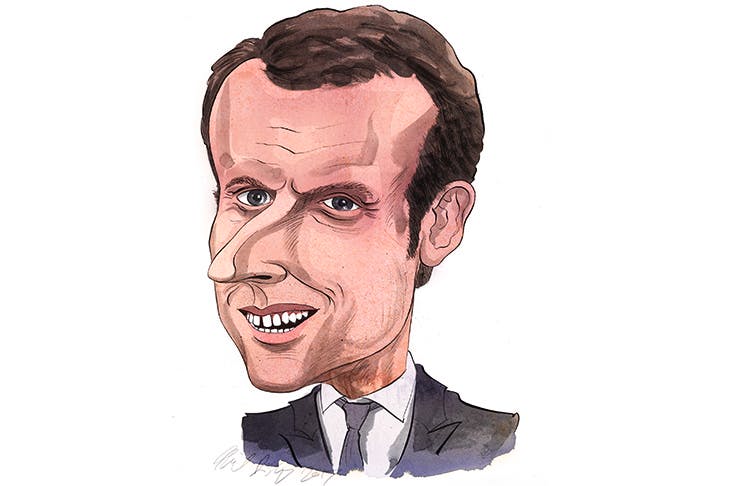President François Hollande was unable to fix France during his presidency, now expiring. Can he fix the French election by choosing his successor?
Unable to run for a second term because of the problem French voters loathe him, Mr Hollande has told friends his final mission is to prevent the election of Marine Le Pen, candidate of the populist National Front.
A consummate political plotter, Mr Hollande has adroitly — and not even especially covertly — anointed as his successor his former aide and economy minister, the supposedly brilliant and boyish, if slightly odd, Emmanuel Macron.
Macron is a former Rothschild banker, a graduate of the elite École Nationale d’Administration, and 39. A golden boy from provincial France who excelled at exams and married his high-school teacher, 25 years his senior, he is a swot with the characteristic arrogance of the French mandarin. Macron may be blindingly clever, a product of the republican elite, but he is not sympa, as the French say. He has never been elected to anything.
Much of the geriatric socialist establishment has deserted poor Benoît Hamon, the Socialist Party’s official candidate, to support the supposedly independent Macron, who is rallying his supporters under the banner of his own newly minted political movement, En Marche! Hollande, who boasts that Macron’s programme is identical to his own, will certainly come out of the shadows and make his support official before the second round of voting.
With opportunist politicians betting on Macron, much of the French media and corporate elite has rushed to follow. Undisclosed donors are giving evidently large sums. BFMTV, a French news station with its valuable government licence, the state broadcasters and the government-subsidised press have all tirelessly promoted Macron while disparaging his opponents, especially François Fillon and Le Pen.
After Fillon, Macron’s Republican competitor, was accused of corruption, a prosecution for which the crucial evidence appears to have emerged from a sinister government cell at the Finance Ministry, all seemed to be going according to Hollande’s plan. The polls showed Macron in first or second place, and perfectly positioned for round two. Until, quite suddenly, just as Macron was starting to be perceived as inevitable, Hollande’s carefully laid plan started falling apart.
The problem is the voters. They are not buying into the official narrative. They are not evidently loving baby-faced Emmanuel Macron, especially as it dawns on them that he is the hated Hollande’s Mini-Me — a point driven home by Fillon’s campaign.
It is not a foregone conclusion that Macron will face Le Pen in the second run-off on May 7, or even necessarily that he will get to the second round at all. The enthusiasm seems to be flowing towards Macron’s principal opponents.
Indeed, following a rough campaign and two charged debates, it now appears that any of the four currently dominant candidates could plausibly make it to round two: Macron, Le Pen, Fillon and — the wildest card of all — Jean-Luc Mélenchon, a telegenic, charming and unreconstructed candidate of the extreme left who wants to cut the working week to 32 hours. The polls, which are even less reliable in France than they are in Britain or America, suggest that large numbers of voters remain weakly committed or undecided; it really could be any of the above vs any of the above.
Adding oil to this already slippery macédoine are the seven further candidates. While none stands any serious chance of coming in the top two of round one and thus qualifying for the run-off, their voters could still play a significant role, especially if Hamon throws his support to Mélenchon.
So, with the race too close to call in round one, round two presents the tantalising prospect of no less than six possible outcomes, each with explosive consequences for France, Europe and, indeed, the UK.
If Macron continues to weaken as his authenticity is questioned, the second round could see a contest between Mélenchon and Le Pen, one that would surely cause the European Union to tremble, if not disintegrate, all of which might make Brexit look prescient.
Or Le Pen could face Macron, which would present French voters with a straight choice between nationalism and globalisation. Although the polls predict a Macron victory, that’s not the unanimous view. For Britain, the non-PC, Brexit-admiring Le Pen could be easier to deal with than the Europhile Macron, who emerged from a recent visit to Downing Street threatening the British economy with a migration of jobs to Paris.
Other possible matches are equally intriguing, if less likely. Mélenchon vs Fillon? Fillon vs Le Pen? Fillon vs Macron? Macron vs Mélenchon? Take your pick.
I am an elected municipal councillor and talk to scores, if not hundreds, of French voters from every social class and way of life. I hear plenty of support for Le Pen, including from many young people and women who are concerned about security; much more support than I would have expected for Fillon, and lots of admiration for Mélenchon. Of Macron, oddly, I hear barely a word. I detect no enthusiasm for him whatsoever.
French voters face an unappetising choice, despite the superficial diversity of the menu. There’s an insurrectionist mood and the elite’s plan to install Macron may be wishful thinking. I think that they imagined Macron could be their Justin Trudeau —but, instead, he is turning out to be more like Ed Miliband.
Jonathan Miller is the author of France: A Nation on the Verge of a Nervous Breakdown (Gibson Square).








Comments